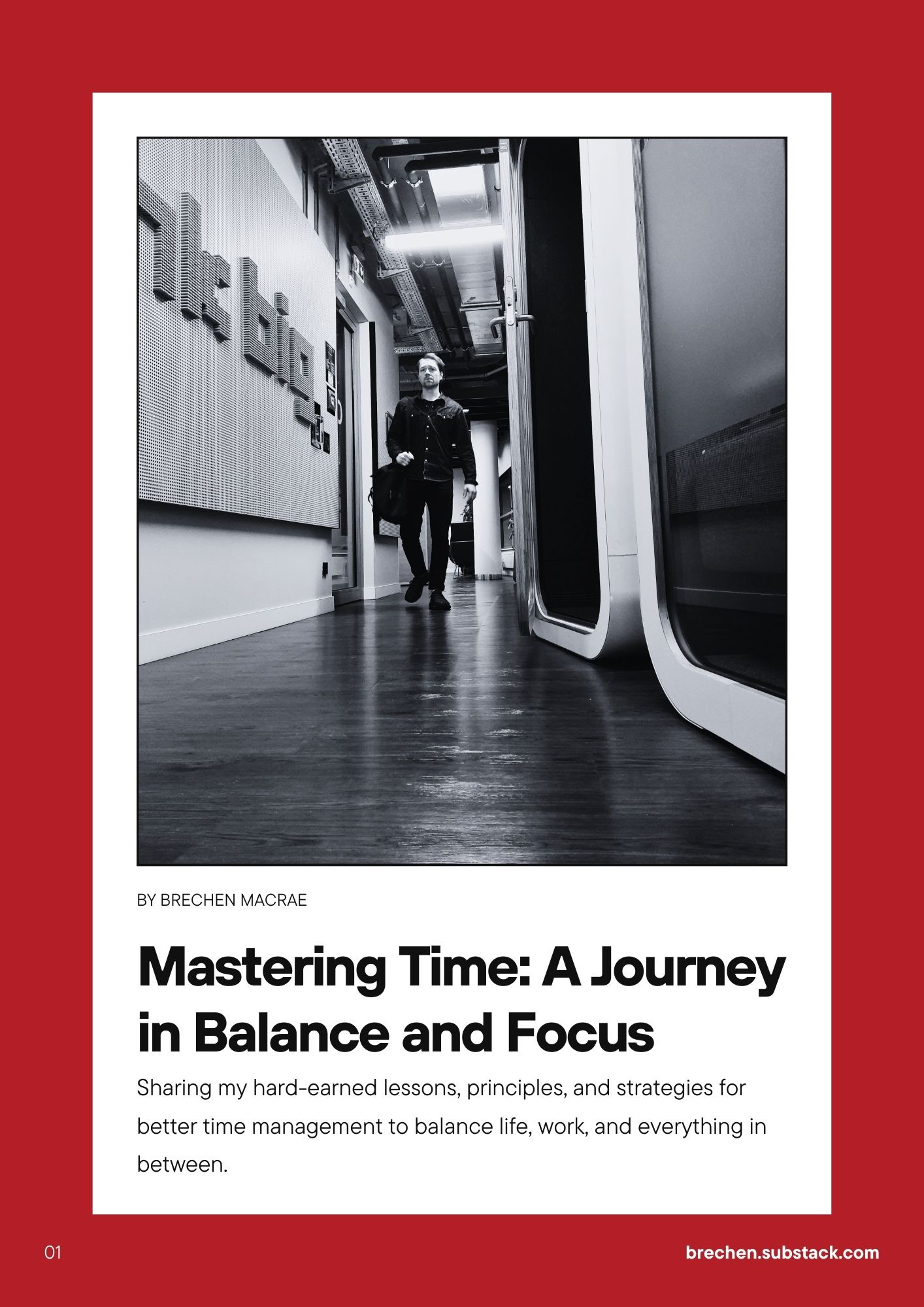Mastering Time: A Journey In Balance And Focus
How I’m Learning to Manage My Time with Principles, Patience, and a Dash of Imperfection
My recent struggles with time management have bordered on the absurd. Over the past two years, since my son was born, I’ve often opened my journal to a blank page, thinking, “If I just tweak my schedule this way, I’ll be more productive.” I’ve tried allocating entire weeks to one type of activity—like writing or content creation. I’ve tried dedicating specific days to certain tasks. I even started waking up at 4:30 AM, heading out the door almost immediately to arrive at the office by 5:30 AM, where no one could demand my attention.
Case in point: just as I wrote that last sentence, sitting here in my living room in the evening, my cat started meowing incessantly. I had to stop and play with him for a while; otherwise, he might wake up my son.
Before my son was born, I did most of my blogging on the weekends. Now, I spend all his waking hours with him. I wouldn’t trade that for the world. After my full-time job, I’m left with only slivers of time for blogging—never longer than an hour and most often just 20 or 30 minutes. I write when he naps and after the apartment is tidied up. I write in the brief moments after morning exercise, before beginning my day at my job. I write in the sleepy hours before bed.
I’ve realized that all this constant schedule-tweaking is really just me resisting a cold, hard truth: I have fewer hours to work on the things I enjoy than I would like. Father Time remains undefeated.
I found that dedicating entire weeks to one activity—like writing, content creation, or researching—left the others neglected for too long. On one hand, I could focus deeply for extended periods. On the other hand, the outcomes I wanted took too long to materialize.
So, last week, I devised yet another new schedule. I’ll alternate days where I focus on one main activity during the largest blocks of time available to me. Every morning, however, when I have just 20 minutes or so, I’ll create content. Every evening, I’ll write, no matter how tired I am, even if just one crappy paragraph is all I can muster. I’ll read in bed every night and squeeze in audiobooks while on the tram or walking to the store. This way, the tide lifts all boats, and I strike a balance between deep focus and incremental progress.
Still, based on my recent track record, I’ll probably revise this schedule in a few weeks.
But I’m tired of this endless wavering. I’m tired of feeling rushed and dissatisfied with my schedule. Instead, I’ve decided to write out some core principles of time management and follow those, rather than allowing blocks of time on a calendar to dictate how I feel.
I did a similar exercise recently with my personal finances. Money is a complex topic—it can feel overwhelming. There are countless variables to consider, but having a framework of principles helps. That’s what I aim to do here: build a set of principles to help me focus on producing outcomes, not just managing time.
My First Principles of Time Management
Balance
I touched on this struggle earlier: the tension between wanting to focus deeply on something for an extended period and not wanting lesser priorities to fall by the wayside. When I neglect one of my main activities for too long, I get anxious, and that anxiety disrupts the quality of my work. It becomes a stressor and a distraction.
To reconcile this, I aim to alternate days focusing on one main task, with tiny blocks of time (15 minutes after breakfast or 20 minutes after lunch) spent on other activities. This may not be perfect, but for now, it feels like the right balance between deep focus and gradual, incremental progress.
You Can Do Many Things, but Not All at Once
Greg McKeown’s Essentialism taught me an important lesson: the word priorities (plural) is nonsensical. A priority is the most important thing. There can only be one.
But what about everything else on the to-do list? Delete it? That’s not always feasible—try telling your boss that.
McKeown’s point isn’t to eliminate every non-priority but to be selective about commitments.
For example, I’ve cut a lot of fat from my blogging life. I no longer obsess over website metrics or tweak aesthetics for hours. I’ve let go of rigid publishing schedules that made blogging feel like a second job. Now, I focus on the essentials: reading, writing, and creating.
Even so, I can’t do it all at once. When I sit down for a 20-minute—or rare one-hour—session, I know exactly what I’ll be working on. Each activity has its time and place. They don’t overlap or compete with each other.
This principle is challenging in practice—it requires patience, prioritization, and focus.
Consistency Is King
Given that I only have an hour or so each day for blogging, consistency is essential. Incremental progress adds up over time.
I do most of my reading before bed. Some nights, I’m so tired I only manage a few pages. But it’s better than nothing.
Ryan Holiday has a saying that I subtly referred to earlier: “Write two crappy pages every day.” His point is that you need to show up. The work has to get done. You can make it better later. I’m lucky if I can write two crappy paragraphs! But I won’t let that stop me.
Follow Your Inspiration
Occasionally, I get the strong urge to create something that’s not part of my ‘core’ blog activities. It could be a new page on my website. Recently, it was creating magazine style posts with elaborate graphic design elements for my The Pursuit of Balance and The Eightfold Parent newsletters. I’ve learned to flow with this creative inspiration. So the principle here is don’t be too rigid in your schedules and priorities. When you feel like doing something, do it. Those moments of intrinsic motivation are when the best work happens.
Cal Newport’s Principles of Time Management
As promised, I’ll unpack here what I understand to be three of Cal Newport’s principles of time management. Newport is a computer scientist, but he’s more known for his books on focus and productivity, like Deep Work, and his latest one from which I’m sharing his time management principles, Slow Productivity: The Lost Art of Accomplishment Without Burnout. His principles are even more fundamental than my own.
Do Fewer Things
Focus on completing one thing before moving to the next.
Work at a Natural Pace
For most of human history, seasons dictated our work—planting, harvesting, migrating, and resting. Now, we’re expected to work at full capacity year-round. Newport suggests building in periods to slow down and recharge.
Obsess Over Quality
Identify your most valuable activities and invest time and resources in doing them well. Eliminate distractions that detract from these efforts.
By blending my principles with Newport’s, I hope to find a rhythm that works for me—not merely to manage time, because chasing after time is incompatible with mindful living. I’ll stop obsessing over calendars and schedules and instead practice focus, prioritization, and following my heart to create outcomes that I’m proud of.




